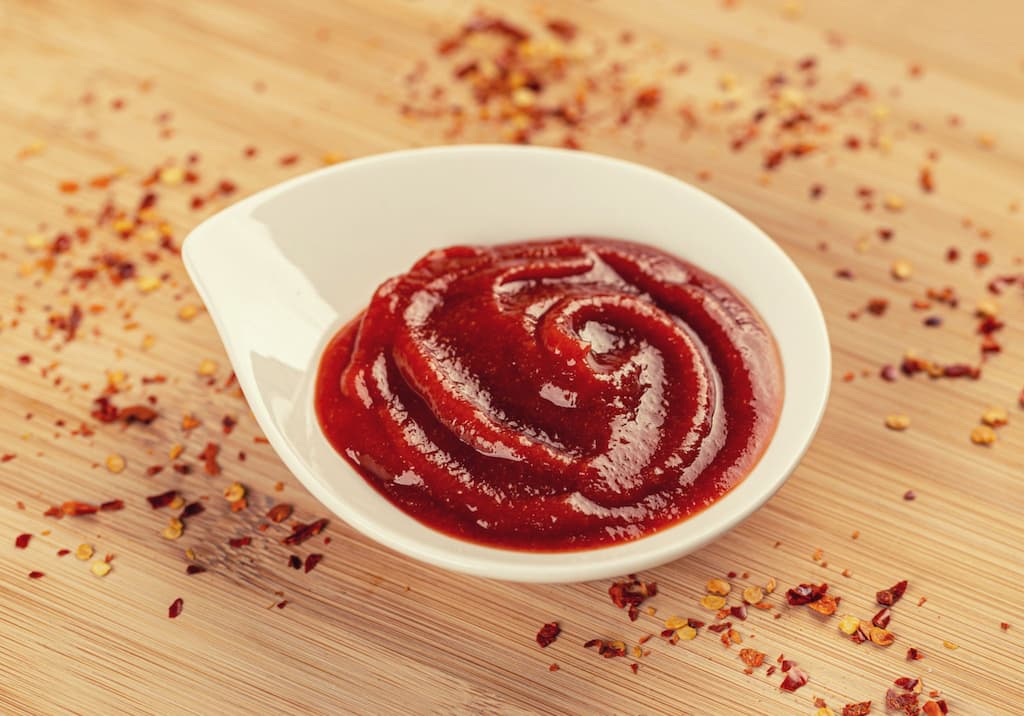Ketogenic diets require proper research when it comes to the foods that you can have. This is because you’re only allowed a certain amount of carb intake per day. If the amount of carbs were to be increased, it would simply kick you out of ketosis which negates the whole point of keto-diets.
Now considering ketchup, it is a sauce that adds flavor to your favorite snacks and meals -thus making everything taste so much better.

If you have just started a keto-diet, you might be wondering is ketchup keto? What is ketchup made of and whether or not you can add ketchup to your meals. We have got you covered! This article will provide you with a detailed insight into ketchup and whether it is keto friendly or not.
What Is Ketchup?
Ketchup is a preparation or a sauce that is added to food after it is cooked. Adding ketchup to food imparts certain flavors, or simply to enhance the flavor of the food, added to taste.
Ketchup is also referred to as catsup, and tomato ketchup. Looking at the background of ketchup, the first tomato ketchup recipe was made back in 1812. The original 1812 recipe contains tomato pulp, spices, and brandy.
Ideally vinegar and sugar are added but the original recipe uses brandy instead.
However, the recipes evolved with the passage of time and the ketchup that you now see is made with the following ingredients:
- Fresh tomatoes
- Sugar and other sweeteners (granulated cane sugar and beet sugar)
- Salt
- Vinegar
- Seasonings
- Spices
The commonly used spices include:
- Onions
- Allspice
- Coriander
- Cloves
- Cassia
- Cayenne
- Pepper
- Paprika
- Cumin
- Garlic
- Mustard
- Ginger
- Cinnamon
- Celery
Keep in mind, not all of the spices mentioned above are used in making ketchup and only a few of them are used, depending on where you source your ketchup from. There are multiple brands of ketchups available, with each following their own formulas/recipes.
Although they use the same raw materials, the variation is in the number of spices and flavorings they use while making ketchup.
A general rule of thumb that is usually followed when making ketchup is, “the greater the ratio of sugar and spices compared to the tomato juice, the thicker will be the ketchup.”
How Is Ketchup Made?

Making ketchup is an easy process and there is no rocket science behind it. Here is a general insight into how ketchup is made and what are the primary factors involved.
- For making ketchup, high quality tomatoes are required that are consistent in terms of their color, flavor, and texture. The reason behind using consistent tomatoes is that it determines the color and flavor of the end product.
- After sourcing the tomatoes, they are pre-cooked before the pulping process could begin. There are specific machines for it that separate the parts of the tomatoes from the pulp, including seed, skin, and stem parts.
- The pulp and tomato juice are then passed through filter screens to separate them.
- Afterwards, the pulp is cooked and boiled thoroughly. When it is cooked, other ingredients like sweeteners, salt, vinegar, flavors, and spices are added to the cooked pulp. Other secondary ingredients like onions and garlic may also be added if required.
- After adding the ingredients to the pulp, it is cooked for a further 30 to 45 minutes and mixed constantly to avoid burning.
- Afterwards, the excess fiber and particles are filtered out thus leading to a smooth consistency of the ketchup, which is then stored in a container after it is cooled.
Keep in mind, the taste and texture of the ketchup varies based on the amount of spices and sugar used in contrast to the tomato juice.
Overall Nutrient Profile of Ketchup:
A single tablespoon serving (17 grams) of ketchup contains the following nutrients:
| Nutrient Name | Amount |
| Calories | 17 Cal |
| Sodium | 154 mg |
| Total Carbs | 4.7 g |
| Dietary Fiber | 0.1 g |
| Sugar | 3.6 g |
| Protein | 0.2 g |
| Potassium | 48 mg |
Is Ketchup Keto Friendly?
Ketchup is a favorite table condiment of most of the people around the world. But, considering how specific ketogenic diets are in terms of their carb and nutrient intake, is ketchup keto friendly?
Looking at the primary ingredient of ketchup, tomatoes, they are keto friendly as long as you’re consuming them in small amounts. So, based on this, ketchup must be keto friendly as well, right?

Unfortunately, that is not the case here. Ketchup is not keto friendly, because many producers of ketchup rely on sugar and other sweeteners like cane sugar and beet sugar to sweeten the taste of the ketchup.
As a result of this added sugar, the amount of carbs per serving is also greatly increased. A teaspoon of ketchup contains over 4.7 grams of net carbs.
If you were to consume a single teaspoon, then it is okay to have ketchup on a ketogenic diet. However, since most people consume more than a single teaspoon, it increases the carb intake significantly, which has a negative impact on ketosis.
Alternatively, there are other options that allow you to consume more than a single teaspoon of ketchup safely. There are certain low-sugar (only 1 g of net crabs) ketchups available that you can get.
Or, if you’re even more conscious about your carb intake from ketchup, you can make your own ketchup. All you need to do is use smaller amounts of sweeteners and you’ll be good to go.
This way, your homemade ketchup can be considered keto friendly, and you can consume large amounts.
How Many Calories In A Serving Of Ketchup?
Considering the nutritional profile of Ketchup, a teaspoon serving of ketchup contains over 17 calories.
Consuming 17 calories from a teaspoon of ketchup is under the safe limits, but despite this, the amount of carbs in a teaspoon of ketchup is too high for a ketogenic diet.
So, although you may be getting normal amounts of calories from ketchup, the carbohydrate composition is way too high and will kick you out of ketosis if you consume store-bought ketchup frequently.
Keto Friendly Ketchup Alternatives:

Regular ketchup is not safe for keto diets. But that does not mean you cannot do something about it. There are two keto-friendly ketchup alternatives for you to enjoy. These include:
- Getting low-carb ketchup products
- Making your own ketchup at home
Ultimately, the safest option amongst the two is to make your own ketchup. Making your own ketchup allows you to control the amount of ingredients, thus providing you with more flexibility in terms of controlling your total carb intake.
Here’s how to make your own ketchup:
Required Ingredients For Keto Friendly Ketchup:
The primary ingredients of ketchup are the same as the ones used in making regular ketchup with some slight variations. Here are the ingredients that you will be needing for making this keto friendly ketchup:
- Tomato paste (must be of a good quality to ensure smooth texture and flavor of the ketchup)
- Water
- Low-carbs sweetener
- Apple cider vinegar
- Paprika (Smoked or normal)
- Nutmeg spice
- Garlic powder
- Onion powder
- Cloves (in small amount)
Required Keto-Friendly Sweetener In This Low Carb Ketchup Recipe:
Since the primary reason why you can’t consume regular ketchup in large amounts is sugar, there are some keto-friendly sweeteners that you can use instead. Ideally, there are multiple options to choose from to ensure the end product contains a low amount of carbs.
- Erythritol – Erythritol is a sugar alternative that you can use in this low carb recipe. If you can get your hands on the powdered form of erythritol, it will yield the best result. Powdered form of erythritol ensures a smoother texture and consistency of the ketchup which is the ultimate goal.
- Brown low carb sweeteners – Brown low carb sweeteners contain zero calories and low carbs which are perfect for this recipe. Make sure to use Granulated brown sweeteners.
Keto Ketchup Recipe:
- Grab a medium-large sized saucepan. Add the primary ingredients to the saucepan, including water, tomato paste, sweeteners, powdered garlic and onion, paprika, vinegar and nutmeg spice.
- Whisk the ingredients thoroughly so that you get a uniform mixture.
- Let the mixture boil. Once it is boiled, cover the saucepan, and let it simmer on med-low temperatures for 25 – 30 minutes.
- After 25 – 30 minutes, check if the ketchup is thickened. If it is not thickened, let it simmer on med-low heat for another 5 to 10 minutes.
- Afterwards, taste the ketchup and add further salt or spices as desired.
- Once cooked, you need to get an airtight container to store the ketchup in. You need to refrigerate it in the fridge for at least 10 days. The reason why you need to store it in the fridge is that there are no preservatives added unlike storebought ketchups that are stored at room temperatures.
Wrapping Up:
Is ketchup keto? Unfortunately, no. Store-bought and commercially produced ketchups contain multiple sweeteners including sugar. Due to the added sweeteners, the net carbs in ketchup exceed the normal amounts. A single teaspoon of store bought ketchup contains 4.7 grams of net carbs.
As you might know, more than a single teaspoon is consumed in one serving, which makes ketchup not safe for ketogenic diets. However, there is a workaround for this. Alternatively, you can either get a low-carb version of ketchup, or you can simply make ketchup at your home.
Please click on one of the links below to learn more about keto friendly foods:
